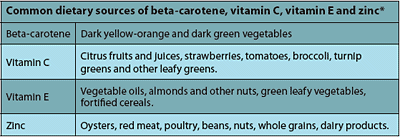Keep an Eye on Good Health
By Editorial Staff
 Age-related macular degeneration (AMD) is the most common cause of irreversible blindness in the developed world. In the United States alone, the number of patients disabled by late-stage AMD is expected to increase more than 50 percent in the next 20 years. This trend will affect upward of 3 million people.
Age-related macular degeneration (AMD) is the most common cause of irreversible blindness in the developed world. In the United States alone, the number of patients disabled by late-stage AMD is expected to increase more than 50 percent in the next 20 years. This trend will affect upward of 3 million people.
According to the National Institutes of Health, AMD is a painless condition that gradually destroys sharp, central vision, which allows you to see objects clearly and perform everyday activities such as reading and driving. The disease affects the macula, the portion of the eye that controls fine vision. AMD is a leading cause of vision loss in Americans age 60 and older.
While the pathophysiology of AMD is not clearly understood, oxidative stress has been suggested as a leading cause. A 2001 study found that high-dose antioxidant supplementation could slow the progression of AMD. However, little research has evaluated the role antioxidants obtained through diet might play in AMD prevention.
In a study published recently in the Journal of the American Medical Association, a research team from the Netherlands analyzed patient data from 4,170 middle-aged subjects, each of whom completed a semi-quantitative food frequency questionnaire. Subjects were tracked for an average of eight years; during that time, 560 were diagnosed with AMD.

*Source: Facts About Dietary Supplements. National Institutes of Health Office of Dietary Supplements.
After analyzing the data, researchers found that high dietary intake of four antioxidants - beta-carotene, vitamins C and E and zinc - was associated with a 35 percent reduced risk of developing AMD. Below-average consumption of all four nutrients was associated with a 20 percent increased risk of AMD. Researchers noted these associations even after considering age, incidence of smoking, blood pressure levels and other risk factors known to contribute to AMD.

